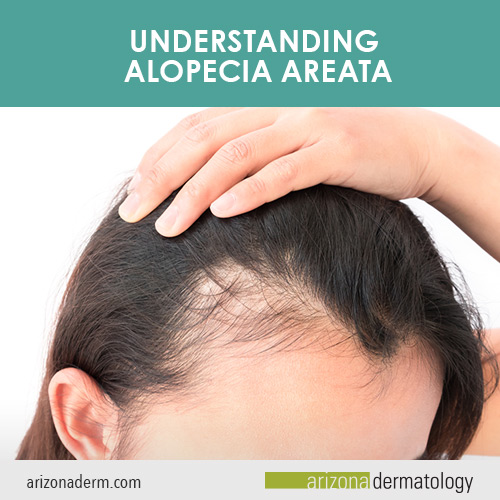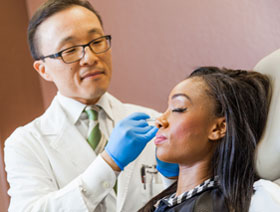 Alopecia areata is a dermatological condition that affects millions of people worldwide, causing hair loss in small, round patches on the scalp and other areas of the body. While it doesn’t pose a direct threat to physical health, the emotional impact of alopecia can be profound, making it essential for patients to understand the condition, take advantage of treatment options, and do what they can at home to manage it.
Alopecia areata is a dermatological condition that affects millions of people worldwide, causing hair loss in small, round patches on the scalp and other areas of the body. While it doesn’t pose a direct threat to physical health, the emotional impact of alopecia can be profound, making it essential for patients to understand the condition, take advantage of treatment options, and do what they can at home to manage it.
What is Alopecia Areata?
Alopecia areata is an autoimmune disorder in which the immune system mistakenly targets hair follicles, leading to hair loss. The word “areata” means “patchy,” and the spots of hair loss do look like bald or thin patches on an otherwise healthy head of hair, or beard. This condition can affect anyone, irrespective of age, gender, or ethnicity, but it mostly begins during childhood or young adulthood. The exact cause remains elusive, but it is believed to involve a combination of genetic, environmental, and immunological factors. A family history of autoimmune diseases may increase the risk. Stress and other environmental triggers can exacerbate the condition or trigger its onset.
Alopecia areata is different for everyone. For some people, hair grows back naturally within a year, and those people might never experience hair loss again. Other times, treatment is needed to overcome the condition. With treatment, most people start to notice some regrowth in about 6 weeks, however, hair can take a few months to fully regrow. Even if hair grows back, future episodes of hair loss can occur.
The Emotional Impact of Alopecia Areata
The emotional toll of alopecia areata should not be underestimated. Beyond its physical manifestation, the sudden and unpredictable nature of hair loss can lead to emotional distress, anxiety, and a decline in self-esteem. Compassion and empathy play a crucial role in supporting individuals facing this challenge, emphasizing the need for both medical and emotional care.
Clinical Approaches to Treatment
There is currently no cure for alopecia areata, but several clinical approaches aim to help patients regrow their hair (including some newer treatments that may help people who weren’t helped by past treatments). Our dermatologists can prescribe corticosteroids, either topically or through injections, to suppress the immune response in affected areas and stimulate hair regrowth. Immunomodulatory drugs and light therapy are also considered in more severe cases. However, the efficacy of these treatments varies from person to person, highlighting the importance of individualized care and ongoing communication between patients and healthcare providers.
What You Can Do at Home
While medical interventions are essential, individuals with alopecia areata can take certain steps at home to manage the condition and promote overall well-being:
- Gentle Hair Care: Use mild, sulfate-free shampoos and conditioners to care for the remaining hair. Avoid harsh chemicals and excessive heat styling, as these can further stress the hair and scalp. Use a soft-bristled brush and wide-tooth comb when styling hair.
- Protect bald or thinning areas from the sun: These areas are more susceptible to sunburn. Wear a hat or use a broad-spectrum sunscreen of SPF 30 or higher.
- Nutritious Diet: Adopting a balanced and nutritious diet can contribute to overall health, potentially supporting the body’s immune system and promoting hair growth. Include a variety of fruits, vegetables, lean proteins, and whole grains in your meals.
- Stress Management: Since stress is often linked to autoimmune conditions, finding effective stress management techniques, such as meditation, yoga, or regular exercise, can be beneficial.
- Supportive Community: Joining support groups or connecting with others who share similar experiences can provide emotional support and a sense of belonging. Online forums and local support groups can offer a platform for sharing insights, coping strategies, and encouragement.
The most important thing to know about alopecia areata is that you don’t have to face it alone. With help from our doctors, you can take charge of hair loss and feel confident in facing the physical and emotional challenges that come with it.


